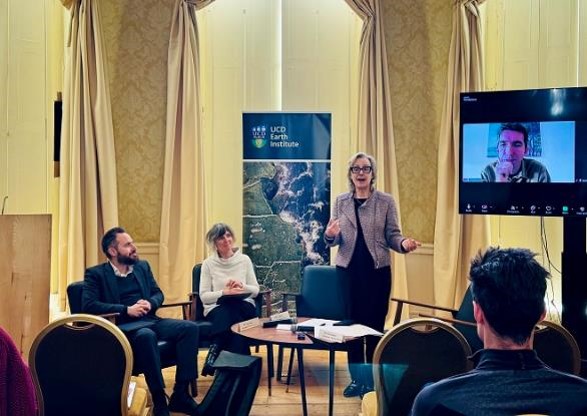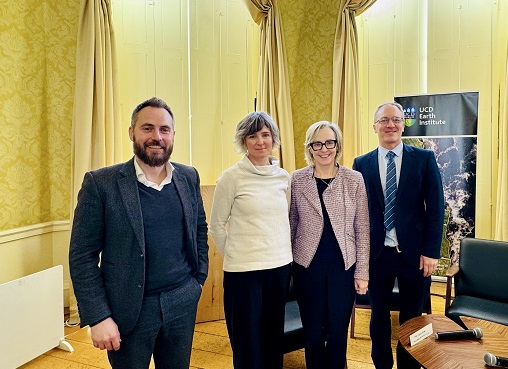Democracy and Environment seminar: delivering climate and environmental action
Wednesday, 27 November, 2024
Share

The Earth Institute hosted our last Democracy & the Environment seminar of 2024 on Tuesday 26 November at the Museum of Literature Ireland (MoLI). The series is inspired by the significance of 2024 as a historic year for elections around the world. Approximately 60 countries representing more than half of the world's total population will elect representatives in presidential, legislative and local elections during this year. Previous seminars in the Democracy & the Environment series covered topics such as climate adaptation in rural areas, urban vacancy, coastal change and communities, and the future of the dairy sector.
This seminar, co-organised with UCD Dublin European Institute and the UCD Centre for Democracy Research, explored the capacity of democratic and legal institutions to deliver climate and environmental action. Contributions explored how climate action and environmental protection are political problems which democratic and legal institutions struggle to solve. This is particularly stark in liberal democracies that aspire to actively engage with the plurality of interests in society and build inclusive coalitions to bring voters along with the huge structural transformations required in the transition to net zero. Speakers discussed the role of legal, political and policy structures in addressing these environmental and climate challenges.

Aidan Regan, Niamh Garvey, Imelda Maher, Eoin O'Neill (Photo: Antonio Soler)
In his contribution (opens in a new window)Professor Aidan Regan (UCD School of Politics & International Relations) talked about the ‘trilemma of advanced capitalism’ whereby governments are increasingly faced with a trade-off between economic growth, democracy and effectively addressing the climate emergency, arguing that it is unlikely that governments can achieve all three objectives simultaneously. This research is part of a project he is working on with Cyril Benoit (Science Po), Hanna Schwander (Humboldt University, Berlin), and Tim Vlandas (University of Oxford).
Second speaker (opens in a new window)Dr Andrew Jackson (UCD School of Law), who spoke online, discussed the role of law and legal institutions in delivering climate action, mentioning a number of key cases, including (opens in a new window)Climate Case Ireland, which have been highly influential in the Irish and European contexts. He also discussed the significant role of the law and legal actions in terms of accountability and ensuring environmental and climate protection.
Finally, (opens in a new window)Niamh Garvey from the (opens in a new window)National and Economic Social Council (NESC) reflected on its role as an independent multi-stakeholder council to advise government and how this can facilitate civil society engagement in policy, sometimes by creating what she called a ‘safe space’ for dialogue and discussion. She also talked about her work on the (opens in a new window)just transition in the agriculture and land use sector report which NESC published in June 2023.
The event was chaired by (opens in a new window)Professor Imelda Maher, Dublin European Institute. A recording of the event can be viewed on the Earth Institute (opens in a new window)YouTube channel. Further events in the series will run next year.